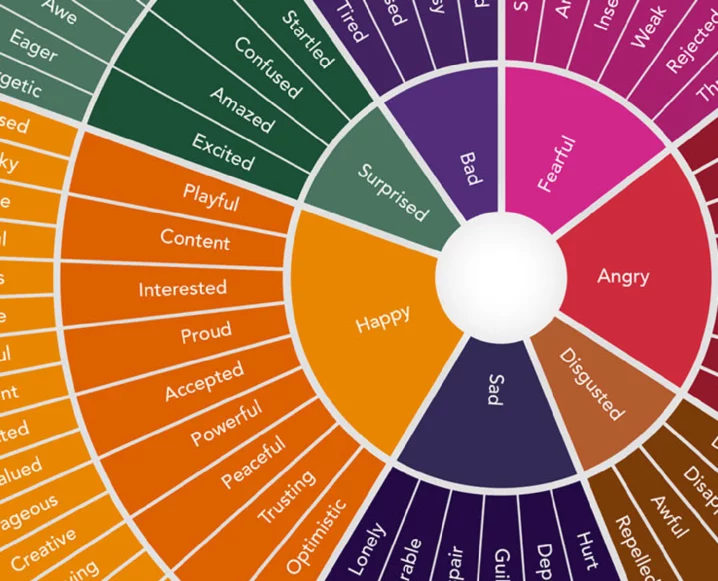Navigating our emotions can feel like sailing uncharted waters. One moment, you’re on a placid lake, and the next, you’re battling stormy seas. Enter the Feelings Wheel—an invaluable tool designed to help us understand and articulate our emotions. For anyone invested in mental health, self-improvement, and emotional wellness, this guide will demystify the Feelings Wheel and show you how to harness its power for a richer, more expressive emotional life.

Credit: Geoffrey Roberts
What is the Feelings Wheel?
The Feelings Wheel, developed by Dr. Gloria Willcox, is a tool designed to help people articulate their emotions more accurately. It categorizes emotions into three levels, making it easier to pinpoint exactly how you’re feeling. Let’s break down this invaluable tool and explore its benefits.
Primary, Secondary, and Tertiary Emotions
The Feelings Wheel is divided into three concentric circles:
- Primary emotions are at the center. These are basic emotions like joy, anger, sadness, fear, surprise, and love.
- Secondary emotions are in the middle circle. These are more specific feelings that stem from primary emotions, such as happiness, frustration, and anxiety.
- Tertiary emotions form the outermost circle. These are even more nuanced, like contentment, irritation, and vulnerability.
By breaking down emotions into these categories, the Feelings Wheel helps us understand the complexity of our feelings, making it easier to address them appropriately.
How to Use the Feelings Wheel
Using the Feelings Wheel is straightforward yet profoundly impactful. Here’s a step-by-step guide to get you started:
Step One: Identify Your Core Emotion
Start at the center of the wheel, where you’ll find core emotions like joy, sadness, fear, anger, surprise, and love. Ask yourself, “What am I feeling right now?” Choose the core emotion that best matches your current state.
Step Two: Explore the Layers
Move outward from the center to explore more nuanced emotions related to your core feeling. For example, if you start with “anger,” the next layer might include feelings like “frustration” or “annoyance.” This helps you pinpoint exactly what you’re experiencing.
Step Three: Reflect and Record
Take a moment to reflect on your identified emotions. Write them down in a journal or use a feelings app to track your emotional states over time. This practice can provide valuable insights into your emotional health.

Benefits of Using the Feelings Wheel
Improved Emotional Literacy
The Feelings Wheel enhances your emotional literacy by expanding your emotional vocabulary. When you can name your feelings, you gain control over them. Dr. Gloria Willcox once said, “Words are a way to discover our feelings and bring them into the light.”
Enhanced Communication
By understanding your emotions better, you can communicate more effectively with others. Whether it’s discussing feelings with a partner or explaining your emotional state to a therapist, the Feelings Wheel provides the language you need.
Better Emotional Regulation
Identifying your emotions is the first step toward regulating them. When you know what you’re feeling, you can employ strategies to manage those emotions constructively. This leads to improved mental health and greater emotional wellness.
Strengthened Relationships
Understanding and articulating your emotions can improve your relationships. When you communicate clearly, you build trust and intimacy, fostering deeper connections with those around you.
Incorporating the Feelings Wheel into your daily life can be a game-changer for your emotional health, relationships, and overall health and wellness. By breaking down complex emotions into manageable parts, you gain clarity and insight that can transform your life.














